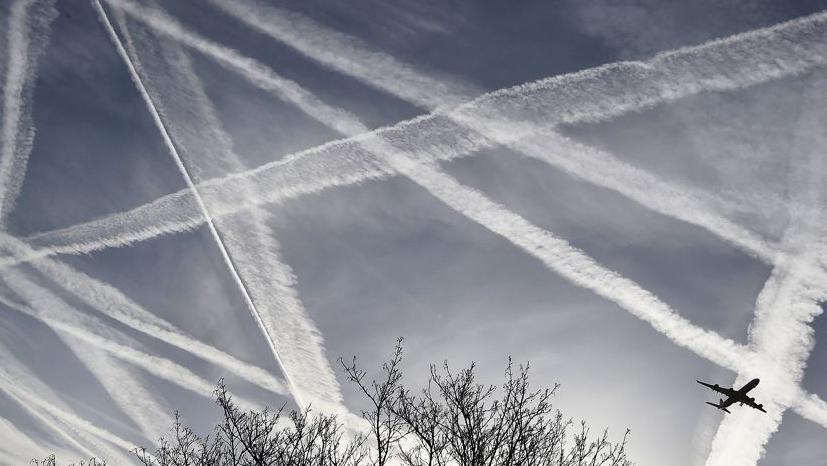Cheap fix floated for plane vapour's climate damage

- Published
The climate-damaging vapours left behind by jet planes could be easily tackled, aviation experts say, with a new study suggesting they could be eliminated for a few pounds per flight.
Jet condensation trails, or contrails, have spawned wild conspiracy theories alleging mind control and the spreading of disease, but scientists say the real problem is their warming effect.
Researchers argue these icy trails essentially double the amount of heating that’s caused by aviation's use of fossil fuels.
The problem will be discussed at the UN climate conference, COP29, in Baku for the first time.
Contrails form in the sky in the same way that your breath goes misty on a chilly morning.
When a plane passes through cold humid air, the contrails form as the vapour from the engines condenses on unburned fuel fragments in the exhaust stream.
While the causes of contrails have been known about for decades, it’s only in recent years that the climate warming impact of these human generated clouds has been recognised.
“They create an artificial layer of clouds, which traps the heat from the Earth that’s trying to escape to outer space,” said Carlos Lopez de la Osa, from the Transport & Environment campaign group, which has carried out a new study on the solutions to contrails.
“The scale of the warming that's associated with them is roughly having a similar impact to that of aviation carbon emissions.”
Conspiracy theories have grown up around contrails, with some people alleging they are in fact “chemtrails” that contain chemical or biological substances.
The aim of these chemtrails is either vaccinating the population, spreading pandemics or controlling the minds of the masses, the conspiracy theories go on to claim.
All of these ideas are completely untrue.
“It is unfortunate that these conspiracy theories are muddying the water on an issue where we need a lot of consensus, a lot of clarity,” said Matteo Mirolo, from Breakthrough Energy, and one of the organisers of the COP29 discussion about the contrails.
“Chemtrails are an unfounded theory. There's simply no scientific backing.”
The COP event, external aims to draw attention to the fact that relatively simple changes to aviation practice could eliminate much of the warming impact of these trails.
According to the Transport & Environment study, some 80% of the warming associated with contrails is generated by just 3% of flights.
Tweaking the flight paths of a handful of aircraft could reduce contrail warming by more than half by 2040, at a cost of less than £4 per flight.
Geography and a flight's latitude have a strong influence on whether a contrail is warming. Flights over North America, Europe and the North Atlantic region accounted for more than half of global contrail warming in 2019, the report said.
Time of day also influences the climate effects of contrails. Those formed by evening and night flights have the largest warming contribution. Seasonality is also important - the most warming contrails tend to occur in winter.
“Planes are already flying around thunderstorms and turbulence areas,” Mr Lopez de la Osa said.
“We will need to add one more constraint to flight planning, which is avoiding areas of contrail formation.”
“Of the climate solutions which are being discussed at COP29, it's arguably one of the simplest ones.”
The researchers are hoping that by holding this event at COP they will spread awareness of the problem and the solutions.
They point to the huge amounts of money and research going into developing sustainable aviation fuels.
They believe that tackling contrails could achieve a major win for the climate, at a fraction of the cost.

Sign up for our Future Earth newsletter to get exclusive insight on the latest climate and environment news from the BBC's Climate Editor Justin Rowlatt, delivered to your inbox every week. Outside the UK? Sign up to our international newsletter here.